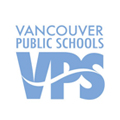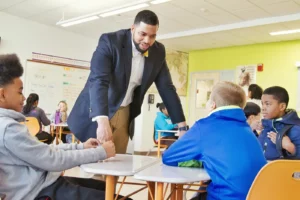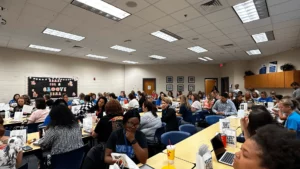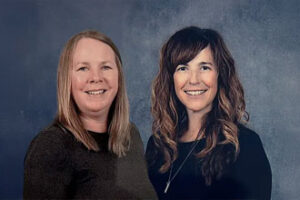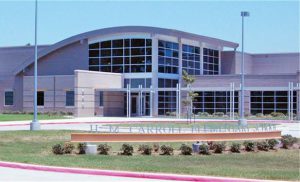How can a large, diverse district ensure all special education teachers are consistent in writing standards-aligned IEP goals that truly reflect an individual student’s specific needs? Furthermore, how can a large district utilize its existing structures when implementing a new resource to enhance adoption and ensure special educators are supported properly?
These are the challenges that Vancouver Public Schools (VPS) set out to address when it began its partnership with Goalbook in the spring of 2022. By partnering with Goalbook, VPS envisioned that the holistic, research-based solution Goalbook Toolkit would support consistency among special educators in writing standards-aligned IEP goals. Additionally, VPS wanted to capitalize on the collaboration and thought-partnership Goalbook offers to reinforce an infrastructure that bolsters and aligns the district’s hundreds of special educators.
Two years into the implementation, VPS’s special education leadership team, led by Daniel Bettis, Jami Phelps, Allison Abernathy, Jennifer Ross, Sonja Hanchar, and Heidi Donahue has successfully implemented Goalbook Toolkit to increase their inclusive practices and support high-leverage, standards-aligned IEP writing. As a result, teachers reported an increase in effectiveness and confidence.
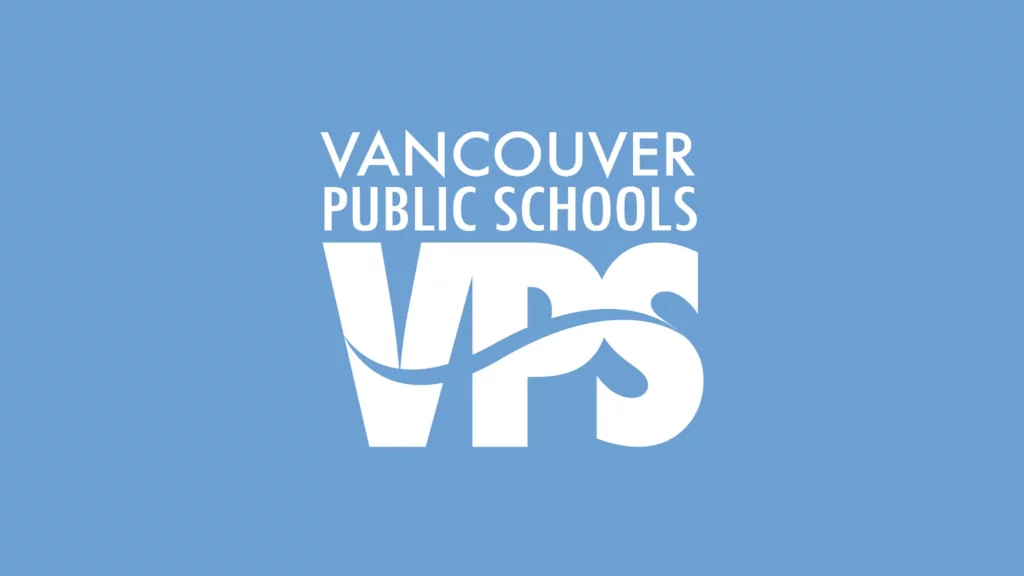
VPS Partners with Goalbook
Located in Vancouver, Washington, Vancouver Public Schools is comprised of 38 schools that serve 22,000 students in Pre-K through 12th grade. VPS is a culturally diverse district with nearly 100 different languages spoken and a minority student population of approximately 47%. Additionally, 16% of students receive special education services.
According to Assistant Director of Compliance Allison Abernathy, “As a district we were really looking at how Goalbook Toolkit can help develop standards-aligned IEP goals and increase inclusive practices.” The special education leadership team had previously heard about Goalbook, and they decided partnering with Goalbook would be an opportunity to address IEP goal writing.
After a small group of learning support teachers reported that using Goalbook Toolkit “was amazing,” other special educators, including self-contained teachers, began asking for access to it as well. “We knew we had to get it into the hands of all our teachers,” Allison said.
Logan, Goalbook’s District and School Customer Success Manager for VPS, worked closely with the district team to plan and lead trainings that met the varied needs of learning support teachers and self-contained teachers. Logan also provided targeted training for the Assistant Directors to help them dig deeper into Goalbook Toolkit.
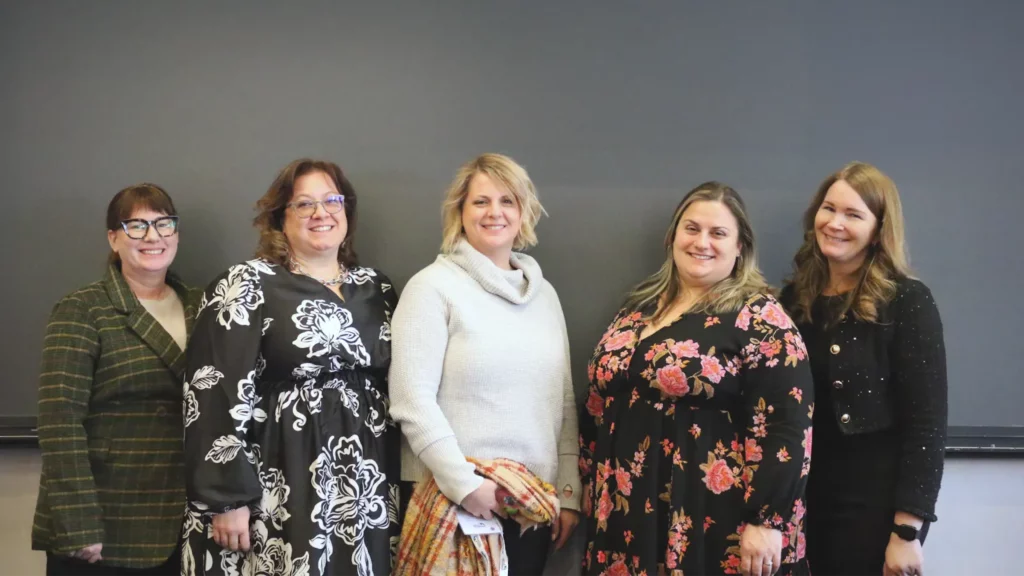
VPS Weaves Goalbook Toolkit Into Their Established Structures
In large, diverse districts, implementation of a resource like Goalbook Toolkit can be challenging due to the high number of special educators who have a wide range of diverse student needs.
To support special educators in writing personalized, standards-aligned IEP goals for students in any placement, whether it be in a developing skills class or a general education class, VPS found intuitive ways to weave Goalbook Toolkit into their existing structures to maximize the benefits of Goalbook Toolkit:
- Monthly Open Labs for On-Going Learning Opportunities
Teachers in VPS are given professional development funds that they can use to pay for themselves to attend different classes in the district. Paying teachers and allowing them to choose what professional development opportunities they want to attend helps create more buy-in and “honors their time to get help,” Assistant Director of Special Services Heidi Donahue said.
The monthly open labs are one of these professional development opportunities. Teachers “register for a class, get answers to questions, and get individualized support,” said Allison. All while getting paid to be there.
The district team chooses to offer open lab options throughout the school year for special educators to learn more about writing high-quality IEPs. During these open labs, Goalbook Toolkit resources are offered that help measure student present levels and progress, and to design instruction for students who are more impacted and further away from grade-level standards.
Integrating Goalbook Toolkit into an open lab was a seamless way to support the district’s goal of writing standards-aligned IEPs.
- Clear Processes to Create Accountability and Offer Feedback
The district team uses a virtual platform as a means for special education teachers across the large district to submit their IEPs to receive feedback from the central special education team.
In the first year of implementation, the expectation was that by Thanksgiving, teachers would submit one IEP written with the help of Goalbook Toolkit. The district team would then review the IEPs along with the monthly data reports sent from Goalbook’s District and School Customer Success Manager, Logan.
The district team positively reinforced individuals who wrote IEPs with the help of Goalbook Toolkit. For teachers who needed further guidance, the district team sent email reminders about Goalbook’s professional development webinars for educators, or scheduled time to sit down with both self-contained teachers and learning support teachers to “show them how they can use Goalbook Toolkit to create standards-aligned IEP goals and use the structures and scaffolds aligned to grade-level standards for students in a developing skills class,” said Allison.
- Consistent Communication through a Bulletin
Each week, the district team sends a Bulletin out to their special educators to help keep everyone on the same page across the district. The district team started using the Bulletin as a vehicle to provide regular Goalbook Toolkit tips and announcements for upcoming Goalbook professional development webinars for educators.
Once a month, the district team mentions a Goalbook Toolkit super-user in the Bulletin. According to Allison, the super-user may be one who has “an ‘Aha!’ experience of understanding they really can write standards-aligned IEPs for students and how to use Goalbook Toolkit as a resource to do that.” A super-user may also be an educator who has accessed and used a lot of Goalbook Toolkit resources. This celebrates usage but also helps the district team identify and elevate teacher-leaders.
During the first year of implementation, the district team set a goal for the calendar year based on the use of Goalbook Toolkit. So, in the Bulletin, the district team reports to teachers how many resources from Goalbook Toolkit they are using to write standards-aligned IEPs. Sharing the data with teachers in this way proved to be powerful, as VPS educators met the goal by October.
Highlighting the amount of Goalbook Toolkit resources teachers are using “tells me that they’re really looking at resources to help them write high-quality, standards-aligned IEPs,” Allison said. “We can tell that teachers are using Goalbook Toolkit for best practices for kids, and that is a huge success.”
- Coaching Cycles that Offer Self-Directed Opportunities to Learn
A coaching cycle is a self-directed learning opportunity for teachers district-wide to request additional help and support in a specific area. For example, special educators may request a coaching cycle from the district team on writing standards-aligned IEPs or incorporating UDL-aligned strategies into their instruction.
“A coaching cycle can be for a variety of purposes,” said Heidi. “And Goalbook Toolkit can be implemented in all of them.”
VPS Special Educators’ Confidence in Writing Standards-Aligned IEP Goals Increases as a Result of Using Goalbook Toolkit
After implementing Goalbook Toolkit, the VPS special education department has seen notable results. In a Goalbook-provided pre/post survey, VPS special educators were asked to rate their readiness and the degree their practice may have changed since using Goalbook Toolkit.
VPS teachers reported:
- 10% increase in readiness in writing goals that are appropriately scaffolded to meet the diverse needs of learners.
- 24% increase in readiness in creating standards-aligned, grade-level goals.
- 15% increase in readiness in developing specially designed instruction aligned to grade-level standards.
Logan from Goalbook said, “VPS teachers are telling us they like using Goalbook Toolkit, and the data shows Goalbook Toolkit has helped VPS teachers improve their practice in writing standards-aligned goals.”
Key Takeaways from Vancouver Public Schools
When a large district invests time and weaves the implementation of a resource like Goalbook Toolkit into its existing structures, it can lead to both educator empowerment and buy-in to change.
Assistant Director of Special Services Heidi used Goalbook Toolkit as a teacher. Now as a district leader, Heidi said, “It’s great to be able to coach and teach others about Goalbook Toolkit. It’s just so helpful with the development and writing of high-quality, standards-aligned IEPs. It’s an awesome solution.”
Logan from Goalbook said, “VPS has a lot of structures that have made the implementation of Goalbook Toolkit really successful. VPS has done a nice job of giving teachers clear expectations and support in different ways. I’m proud that Goalbook Toolkit is integrated into the fabric of VPS special education services.”
Learn more about how Goalbook supports districts.
